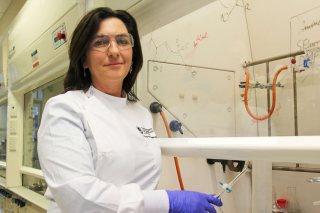Shetland woman at the cutting edge of medical research

Shetland woman Dr Avril Robertson, daughter of Jim Robertson and Barbara Henry, finds herself standing at the forefront of research which may provide treatment for a range of inflammatory diseases. Her research in medicinal chemistry at The University of Queensland has recently received commercial backing, attracting an investment of 15 million euros. This funding will be used to support an Ireland-based start-up business which was founded on the back of the promising research into anti-inflammatory molecules by The University of Queensland and Trinity College Dublin. Inflazome’s goal is to produce treatments to combat inflammatory diseases such as arthritis, asthma, Parkinson’s, Alzheimer’s and MS. From Australia she spoke to KEEGAN MURRAY via a Skype call.
From an early age Avril Robertson was fascinated by chemistry. After attending Sound Primary School Avril went to the Anderson High where chemistry was always a standout subject.
To this day Avril still has fond memories of her chemistry teacher Mervin Linklater, who she described as “an absolute inspiration”.
Always an exceptional student Avril’s potential was recognised, and she was the “very fortunate” recipient of Arthur Anderson and Sullom Voe bursaries.
These funds allowed her to pursue her passion for chemistry at degree level. Avril attended the University of St Andrews, where she came top of her class.
Despite her obvious aptitude for science Avril claims that she “never expected to do so well”.
After completing her degree Avril moved to Switzerland for a work placement, after which she returned to St Andrews to complete her PhD, which centred around naturally occurring anti-cancer compounds.
Unfortunately, memories of her PhD research at St Andrews have taken on a tragic tinge, after her supervisor, Nigel Botting, died of cancer aged 49.
Avril remembers Dr Botting as “a highly talented and inspirational teacher” who “found a love of Shetland”.
She also noted that Dr Botting’s widow Catherine “visited Shetland only a few weeks ago and loves it still”.
In her work, as in her studies, Avril excelled. She started her career in Cornwall working for Tripos Discovery Research. In seven years at the company Avril progressed up the chain quickly, becoming a senior medicinal chemist and team leader.
She continued her career at Cyclcel in Dundee as a project leader researching anti-cancer compounds. This was to be her last job in the UK, for the time being at least.
Before moving to Brisbane to work at The University of Queensland’s Institute for Molecular Bioscience Avril took two years off to have her second son – now aged seven. It was in this role Avril applied her medicinal chemistry experience to research novel molecules which can stop the action of inflammasomes in disease.
Inflammasomes are protein molecules which activate the body’s immune response. They play a crucial role in fighting infection but can lead to health problems when they are overactive.
Conditions such as arthritis, gout, type-two diabetes, Alzheimer’s, asthma and Parkinson’s have all been linked to overactive immune systems, meaning that the research conducted by The University of Queensland and Trinity College Dublin has the potential to treat millions of people.
Inflazome aims to develop oral drugs, using a molecule synthesised by the researchers, which can be taken to inhibit inflammasomes. Using the recent funding boost of 15 million euros the company hopes to move forward into clinical trials.
Avril said that the anti-inflammatory molecules she has been working on “could treat many thousands of people and potentially make billions.”
She added: “It’s strange to think that if this succeeds people around the world might be taking a drug for inflammation that I designed and made.”

In discussing her career to date Avril said that she hoped young Shetlanders would see the possibilities available to them if they are committed to work and study.
She said: “I think one thing you should always do is pursue your passions. Don’t allow yourself to be restrained by the fact that you come from a small island.
“I think if you looked at the statistics of me achieving what I have, being a woman in an industry perceived as quite masculine and being from Shetland, the odds would be very small, but everyone has tremendous potential, regardless of their background, gender or where they’re from.”
And despite trading in the grey Shetland winters for the never ending sunshine and breathtaking scenery of Queensland Avril says that she still misses her home all of the time.
Rattling off a list of things she misses about Shetland Avril spoke of “The ‘mirrie dancers’, fishing with David Pottinger, the majestic cliffs and seabirds – especially the gannets, tirricks and Tammie Nories – the calm of the simmer dim and the wild storms of winter, the reels at the dances, the fiddles, New Year (especially reestit mutton), Up-Helly-A’, and most of all the people.”








Davina brown
Wonderful to read of such a talented dedicated scientist to devise a potential cure for so many inflammatory diseases. Having lived in shetland for a period of my life and attended the central school and Anderson High school I still have a keen affection for the island
I haven’t been there for the past 40 years but thanks to fb you can still see so many articles like this one keeping your memories alive.
So happy for Aviril and the people of shetland that she has gained this recognition. Hope some day soon to come back for a return visit.